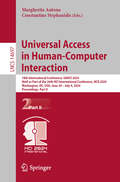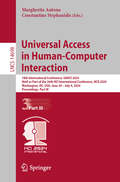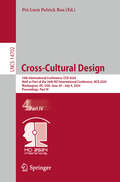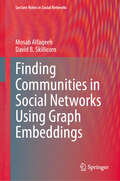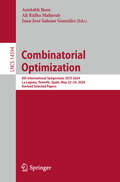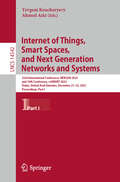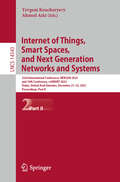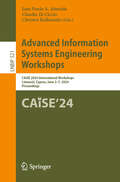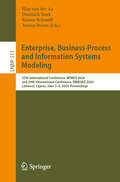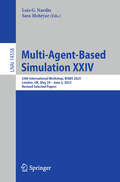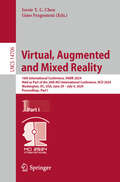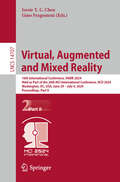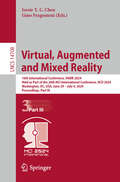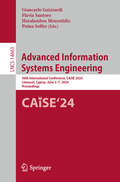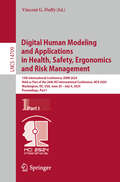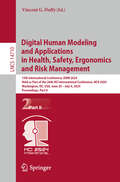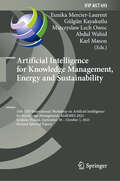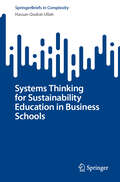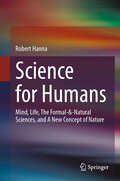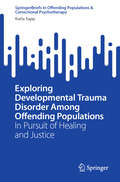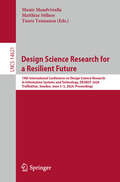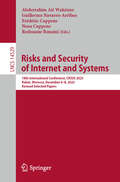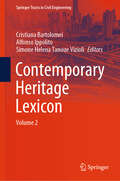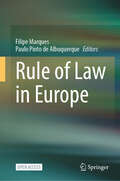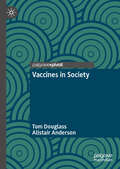- Table View
- List View
Universal Access in Human-Computer Interaction: 18th International Conference, UAHCI 2024, Held as Part of the 26th HCI International Conference, HCII 2024, Washington, DC, USA, June 29 – July 4, 2024, Proceedings, Part II (Lecture Notes in Computer Science #14697)
by Margherita Antona Constantine StephanidisThis three-volume set LNCS 14696-14698 constitutes the refereed proceedings of the 18th International Conference on Universal Access in Human-Computer Interaction, UAHCI 2024, held as part of the 26th International Conference, HCI International 2024, in Washington, DC, USA, during June 29 – July 4, 2024. The total of 1271 papers and 309 posters included in the HCII 2024 proceedings was carefully reviewed and selected from 5108 submissions. The UAHCI 2024 proceedings were organized in the following topical sections: Part I: User Experience Design and Evaluation for Universal Access; AI for Universal Access. Part II: Universal Access to Digital Services; Design for Cognitive Disabilities; Universal Access to Virtual and Augmented Reality. Part III: Universal Access to Learning and Education; Universal Access to Health and Wellbeing; Universal Access to Information and Media.
Universal Access in Human-Computer Interaction: 18th International Conference, UAHCI 2024, Held as Part of the 26th HCI International Conference, HCII 2024, Washington, DC, USA, June 29 – July 4, 2024, Proceedings, Part III (Lecture Notes in Computer Science #14698)
by Margherita Antona Constantine StephanidisThis three-volume set LNCS 14696-14698 constitutes the refereed proceedings of the 18th International Conference on Universal Access in Human-Computer Interaction, UAHCI 2024, held as part of the 26th International Conference, HCI International 2024, in Washington, DC, USA, during June 29 – July 4, 2024. The total of 1271 papers and 309 posters included in the HCII 2024 proceedings was carefully reviewed and selected from 5108 submissions. The UAHCI 2024 proceedings were organized in the following topical sections: Part I: User Experience Design and Evaluation for Universal Access; AI for Universal Access. Part II: Universal Access to Digital Services; Design for Cognitive Disabilities; Universal Access to Virtual and Augmented Reality. Part III: Universal Access to Learning and Education; Universal Access to Health and Wellbeing; Universal Access to Information and Media.
Cross-Cultural Design: 16th International Conference, CCD 2024, Held as Part of the 26th HCI International Conference, HCII 2024, Washington, DC, USA, June 29 – July 4, 2024, Proceedings, Part IV (Lecture Notes in Computer Science #14702)
by Pei-Luen Patrick RauThis four-volume set LNCS 14699-14702 constitutes the thoroughly refereed proceedings of the 16th International Conference on Cross-Cultural Design 2024 (CCD 2024), held as part of the 26th International Conference on Human-Computer Interaction, HCI International 2024 (HCII 2024), was held as a hybrid event in Washington DC, USA, during June/July 2024. The total of 1271 papers and 309 posters included in the HCII 2023 proceedings was carefully reviewed and selected from 5108 submissions. The CCD 2024 conference focuses a broad range of theoretical and applied issues related to Cross-Cultural Design and its applications, and much more.
Finding Communities in Social Networks Using Graph Embeddings (Lecture Notes in Social Networks)
by David B. Skillicorn Mosab AlfaqeehCommunity detection in social networks is an important but challenging problem. This book develops a new technique for finding communities that uses both structural similarity and attribute similarity simultaneously, weighting them in a principled way. The results outperform existing techniques across a wide range of measures, and so advance the state of the art in community detection. Many existing community detection techniques base similarity on either the structural connections among social-network users, or on the overlap among the attributes of each user. Either way loses useful information. There have been some attempts to use both structure and attribute similarity but success has been limited. We first build a large real-world dataset by crawling Instagram, producing a large set of user profiles. We then compute the similarity between pairs of users based on four qualitatively different profile properties: similarity of language used in posts, similarity of hashtags used (which requires extraction of content from them), similarity of images displayed (which requires extraction of what each image is 'about'), and the explicit connections when one user follows another. These single modality similarities are converted into graphs. These graphs have a common node set (the users) but different sets a weighted edges. These graphs are then connected into a single larger graph by connecting the multiple nodes representing the same user by a clique, with edge weights derived from a lazy random walk view of the single graphs. This larger graph can then be embedded in a geometry using spectral techniques. In the embedding, distance corresponds to dissimilarity so geometric clustering techniques can be used to find communities. The resulting communities are evaluated using the entire range of current techniques, outperforming all of them. Topic modelling is also applied to clusters to show that they genuinely represent users with similar interests. This can form the basis for applications such as online marketing, or key influence selection.
Combinatorial Optimization: 8th International Symposium, ISCO 2024, La Laguna, Tenerife, Spain, May 22–24, 2024, Revised Selected Papers (Lecture Notes in Computer Science #14594)
by Amitabh Basu Ali Ridha Mahjoub Juan José Salazar GonzálezThis book constitutes the refereed proceedings of the 8th International Symposium on Combinatorial Optimization, ISCO 2024, held in La Laguna, Tenerife, Spain, during May 22–24, 2024. The 30 full papers included in this book were carefully reviewed and selected from 46 submissions. They were organized in topical sections as follows: integer programming; graph theory; parameterized algorithms; approximation algorithms; integer programming for machine learning; and applications.
Internet of Things, Smart Spaces, and Next Generation Networks and Systems: 23rd International Conference, NEW2AN 2023, and 16th Conference, ruSMART 2023, Dubai, United Arab Emirates, December 21–22, 2023, Proceedings, Part I (Lecture Notes in Computer Science #14542)
by Yevgeni Koucheryavy Ahmed AzizThis book constitutes the refereed proceedings of the 23rd International Conference on Next Generation Wired/Wireless Networking, NEW2AN 2023, and the 16th Conference on Internet of Things and Smart Spaces, ruSMART 2023, held in Dubai, United Arab Emirates, in December 21–22, 2023. The 67 full papers included in the joint proceedings were carefully reviewed and selected from 258 submissions. They present a unique cross-disciplinary mixture of telecommunications-related research and science, various aspects of next generation data networks, while special attention is given to advanced wireless networking and applications.
Internet of Things, Smart Spaces, and Next Generation Networks and Systems: 23rd International Conference, NEW2AN 2023, and 16th Conference, ruSMART 2023, Dubai, United Arab Emirates, December 21–22, 2023, Proceedings, Part II (Lecture Notes in Computer Science #14543)
by Yevgeni Koucheryavy Ahmed AzizThis book constitutes the refereed proceedings of the 23rd International Conference on Next Generation Wired/Wireless Networking, NEW2AN 2023, and the 16th Conference on Internet of Things and Smart Spaces, ruSMART 2023, held in Dubai, United Arab Emirates, in December 21–22, 2023. The 67 full papers were carefully reviewed and selected from 258 submissions. The NEW2AN 2023 is well-established conference with a unique cross-disciplinary mixture of telecommunications-related research and science, various aspects of next generation data networks, while special attention is given to advanced wireless networking and applications.
Advanced Information Systems Engineering Workshops: CAiSE 2024 International Workshops, Limassol, Cyprus, June 3–7, 2024, Proceedings (Lecture Notes in Business Information Processing #521)
by Christos Kalloniatis Claudio Di Ciccio João Paulo A. AlmeidaThis book constitutes the thoroughly refereed proceedings of the international workshops associated with the 36th International Conference on Advanced Information Systems Engineering, CAiSE 2024, which was held in Limassol, Cyprus, during June 2024. The total of 25 full and 5 short papers included in these proceedings were carefully reviewed and selected from 60 submissions. They stem from the following workshops: – International Workshop on Blockchain for Information Systems (BC4IS24) and Blockchain for Trusted Data Sharing (B4TDS); – 2nd International Workshop on Hybrid Artificial Intelligence and Enterprise Modelling for Intelligent Information Systems (HybridAIMS); – 2nd International Workshop on Knowledge Graphs for Semantics-driven Systems Engineering (KG4SDSE); – 16th International Workshop on Enterprise & Organizational Modeling and Simulation (EOMAS); – International Workshop on Digital Transformation with Business Process Mining (DigPro).
Enterprise, Business-Process and Information Systems Modeling: 25th International Conference, BPMDS 2024, and 29th International Conference, EMMSAD 2024, Limassol, Cyprus, June 3–4, 2024, Proceedings (Lecture Notes in Business Information Processing #511)
by Arnon Sturm Rainer Schmidt Han van der Aa Dominik BorkThis book contains the refereed proceedings of two long-running events held along with the CAiSE conference relating to the areas of enterprise, business-process and information systems modeling: - the 25th International Conference on Business Process Modeling, Development and Support, BPMDS 2024, and - the 29th International Conference on Exploring Modeling Methods for Systems Analysis and Development, EMMSAD 2024. The conferences were taking place in Limassor, Cyprus, during June 3–4, 2024. For BPMDS 8 full papers and 3 short papers were carefully reviewed and selected for publication from a total of 25 submissions; for EMMSAD 11 full papers and 5 short papers were accepted from a total of 32 submissions after thorough reviews. The BPMDS papers deal with a broad range of theoretical and applications-based research in business process modeling, development and support. EMMSAD focusses on modeling methods for systems analysis and development.
Multi-Agent-Based Simulation XXIV: 24th International Workshop, MABS 2023, London, UK, May 29 – June 2, 2023, Revised Selected Papers (Lecture Notes in Computer Science #14558)
by Luis G. Nardin Sara MehryarThis book constitutes the refereed Proceedings of the 24th International Workshop on Multi-Agent-Based Simulation XXIV, MABS 2023, held in London, UK, during May 29–June 2, 2023. The 11 regular papers presented were carefully reviewed and selected from 27 submissions. The papers are organized in subject areas as follows: MABS methodology and tools; MABS and social behavior; and MABS applications.
Virtual, Augmented and Mixed Reality: 16th International Conference, VAMR 2024, Held as Part of the 26th HCI International Conference, HCII 2024, Washington, DC, USA, June 29 – July 4, 2024, Proceedings, Part I (Lecture Notes in Computer Science #14706)
by Gino Fragomeni Jessie Y. C. ChenThis three-volume set LNCS 14706-14708 constitutes the refereed proceedings of the 16th International Conference on Virtual, Augmented and Mixed Reality, VAMR 2024, held as part of the 26th International Conference, HCI International 2024, in Washington, DC, USA, during June 29 – July 4, 2024. The total of 1271 papers and 309 posters included in the HCII 2024 proceedings was carefully reviewed and selected from 5108 submissions. The VAMR 2024 proceedings were organized in the following topical sections: Part I: : Perception, Interaction and Design; User Experience and Evaluation. Part II: Immersive Collaboration and Environment Design; Sensory, Tangible and Embodied Interaction in VAMR. Part III: Immersive Education and Learning; VAMR Applications and Development.
Virtual, Augmented and Mixed Reality: 16th International Conference, VAMR 2024, Held as Part of the 26th HCI International Conference, HCII 2024, Washington, DC, USA, June 29 – July 4, 2024, Proceedings, Part II (Lecture Notes in Computer Science #14707)
by Gino Fragomeni Jessie Y. C. ChenThis three-volume set LNCS 14706-14708 constitutes the refereed proceedings of the 16th International Conference on Virtual, Augmented and Mixed Reality, VAMR 2024, held as part of the 26th International Conference, HCI International 2024, in Washington, DC, USA, during June 29 – July 4, 2024. The total of 1271 papers and 309 posters included in the HCII 2024 proceedings was carefully reviewed and selected from 5108 submissions. The VAMR 2024 proceedings were organized in the following topical sections: Part I: : Perception, Interaction and Design; User Experience and Evaluation. Part II: Immersive Collaboration and Environment Design; Sensory, Tangible and Embodied Interaction in VAMR. Part III: Immersive Education and Learning; VAMR Applications and Development.
Virtual, Augmented and Mixed Reality: 16th International Conference, VAMR 2024, Held as Part of the 26th HCI International Conference, HCII 2024, Washington, DC, USA, June 29 – July 4, 2024, Proceedings, Part III (Lecture Notes in Computer Science #14708)
by Gino Fragomeni Jessie Y. C. ChenThis three-volume set LNCS 14706-14708 constitutes the refereed proceedings of the 16th International Conference on Virtual, Augmented and Mixed Reality, VAMR 2024, held as part of the 26th International Conference, HCI International 2024, in Washington, DC, USA, during June 29 – July 4, 2024. The total of 1271 papers and 309 posters included in the HCII 2024 proceedings was carefully reviewed and selected from 5108 submissions. The VAMR 2024 proceedings were organized in the following topical sections: Part I: : Perception, Interaction and Design; User Experience and Evaluation. Part II: Immersive Collaboration and Environment Design; Sensory, Tangible and Embodied Interaction in VAMR. Part III: Immersive Education and Learning; VAMR Applications and Development.
Advanced Information Systems Engineering: 36th International Conference, CAiSE 2024, Limassol, Cyprus, June 3–7, 2024, Proceedings (Lecture Notes in Computer Science #14663)
by Haralambos Mouratidis Pnina Soffer Giancarlo Guizzardi Flavia SantoroThis book constitutes the proceedings of the 36th International Conference on Advanced Information Systems Engineering, CAiSE 2024, which was held in Limassol, Cyprus, during June 3-7, 2024. The 36 full papers included in these proceedings were carefully reviewed and selected from 180 submissions. They were organized in topical sections as follows: Process alignment, comparison and discovery; process discovery, monitoring and correction; graphs and graph networks; process modelling and management; prediction, monitoring and planning; data preparation, sharing, and architecture; requirements; process and decision mining; event and process discovery; session trust, security and risk; social aspects and LLMs; model-driven engineering and quantum workflows.
Digital Human Modeling and Applications in Health, Safety, Ergonomics and Risk Management: 15th International Conference, DHM 2024, Held as Part of the 26th HCI International Conference, HCII 2024, Washington, DC, USA, June 29–July 4, 2024, Proceedings, Part I (Lecture Notes in Computer Science #14709)
by Vincent G. DuffyThis three-volume set LNCS 14709-14711 constitutes the refereed proceedings of the 15th International Conference on Digital Human Modeling and Applications in Health, Safety, Ergonomics and Risk Management, DHM 2024, held as part of the 26th International Conference, HCI International 2024, in Washington, DC, USA, during June 29 – July 4, 2024. The total of 1271 papers and 309 posters included in the HCII 2024 proceedings was carefully reviewed and selected from 5108 submissions. DHM 2024 method focuses on: Part I: Digital Human Modeling for Design and Evaluation; User Experience and Assistive Technologies; User Experience, Communication, and Collaboration. Part II: Healthcare Design and Support; Technology in Mental Health and Wellbeing; Artificial Intelligence and Health Applications. Part III: Work, Safety, and Ergonomics; Ergonomics, Artificial Intelligence and Smart Technologies, Advanced Technologies for Training and Learning.
Digital Human Modeling and Applications in Health, Safety, Ergonomics and Risk Management: 15th International Conference, DHM 2024, Held as Part of the 26th HCI International Conference, HCII 2024, Washington, DC, USA, June 29–July 4, 2024, Proceedings, Part II (Lecture Notes in Computer Science #14710)
by Vincent G. DuffyThis three-volume set LNCS 14709-14711 constitutes the refereed proceedings of the 15th International Conference on Digital Human Modeling and Applications in Health, Safety, Ergonomics and Risk Management, DHM 2024, held as part of the 26th International Conference, HCI International 2024, in Washington, DC, USA, during June 29 – July 4, 2024. The total of 1271 papers and 309 posters included in the HCII 2024 proceedings was carefully reviewed and selected from 5108 submissions. DHM 2024 method focuses on: Part I: Digital Human Modeling for Design and Evaluation; User Experience and Assistive Technologies; User Experience, Communication, and Collaboration. Part II: Healthcare Design and Support; Technology in Mental Health and Wellbeing; Artificial Intelligence and Health Applications. Part III: Work, Safety, and Ergonomics; Ergonomics, Artificial Intelligence and Smart Technologies, Advanced Technologies for Training and Learning.
Artificial Intelligence for Knowledge Management, Energy and Sustainability: 10th IFIP International Workshop on Artificial Intelligence for Knowledge Management, AI4KMES 2023, Krakow, Poland, September 30–October 1, 2023, Revised Selected Papers (IFIP Advances in Information and Communication Technology #693)
by Eunika Mercier-Laurent Abdul Wahid Gülgün Kayakutlu Mieczyslaw Lech Owoc Karl MasonThis volume IFIP AICT 693 constitutes the refereed proceedings of the 10th IFIP International Workshop on Artificial Intelligence for Knowledge Management, AI4KMES 2023, from September 30th – October 1st, 2023, held in Krakow, Poland. The 15 full papers presented together with 2 short papers were carefully reviewed and selected from 49 submissions. The accepted papers covered a large scope of topics related to sustainability in various contexts such as smart cities, agriculture, energy and gas production and distribution, industry, management and biodiversity.
Systems Thinking for Sustainability Education in Business Schools (SpringerBriefs in Complexity)
by Hassan Qudrat-UllahThis book delves into the current state and future prospects of systems thinking and sustainability education within business schools. It meticulously examines the trends and drivers shaping the demand and supply of such education, along with the implications and challenges it presents for various stakeholders and society at large. Strategic recommendations and suggestions are provided to elevate and propel systems thinking and sustainability education in business schools, outlining a visionary roadmap for the future. Furthermore, the book explores the intersectionality of sustainability and diversity in business education, offering examples and cases of visionary and innovative initiatives and projects in the field. Distinguished by special features such as illustrations, the book offers a comprehensive and integrative overview of the current landscape and future trajectories of systems thinking and sustainability education in business schools. The primary benefit for readers lies in gaining a deeper and broader understanding of systems thinking and sustainability education in business schools. It equips them with the knowledge to apply systems thinking and sustainability principles and tools to tackle the complex and wicked problems of the twenty-first century. Additionally, the book aims to inspire and inform business schools and their stakeholders to embrace and enhance systems thinking and sustainability education in their curricula and pedagogy, contributing to the advancement of sustainability and systems thinking in both business and society.
Science for Humans: Mind, Life, The Formal-&-Natural Sciences, and A New Concept of Nature
by Robert HannaThis book presents and defends an original and paradigm-shifting conception of formal science, natural science, and the natural universe alike, that’s fully pro-science, but at the same time neither theological or God-centered, nor solipsistic or self-centered, nor communitarian or social-institution-centered, nor scientistic or science-valorizing, nor materialist/physicalist or reductive, nor—above all—mechanistic. It does this by presenting and defending what Robert Hanna calls the neo-organicist turn, including manifest realism and the three sub-parts of metaphysical organicism: liberal naturalism, mind-life continuity, and explanatory inversion, whereby mechanical systems are explained by grounding them in organic systems, and not the other way around. Or more briefly and simply put, the purpose of this book is to present and defend science for humans. As such, it will be highly interesting and profoundly relevant to graduate students and specialist researchers in philosophy and the formal-&-natural sciences.
Exploring Developmental Trauma Disorder Among Offending Populations: In Pursuit of Healing and Justice (SpringerBriefs in Offending Populations & Correctional Psychotherapy)
by Karla SappThis brief aims to shed light on the prevalence and effects of developmental trauma among offending populations’ emotional, cognitive, and social development. Through a comprehensive review of existing literature and case studies, this brief will explore the complex interplay between developmental trauma and criminal behavior. By understanding the unique challenges faced by individuals with developmental trauma, readers will be able to shape more effective strategies for prevention, intervention, and rehabilitation within the criminal justice system. With a focus on trauma-informed care and evidence-based practices, this brief will offers insights into the urgent need for targeted support and intervention to break the cycle of trauma and offending.
Design Science Research for a Resilient Future: 19th International Conference on Design Science Research in Information Systems and Technology, DESRIST 2024, Trollhättan, Sweden, June 3–5, 2024, Proceedings (Lecture Notes in Computer Science #14621)
by Tuure Tuunanen Munir Mandviwalla Matthias SöllnerThis book constitutes the proceedings of the 19th International Conference on Design Science Research in Information Systems and Technology, DESRIST 2024, which was held in Trollhättan, Sweden, during June 3–5, 2024. The 30 full papers presented in this book were carefully reviewed and selected from 69 submissions. The papers are divided into the following topical sections: DSR for a resilient world (theme track); general track; DSR methods and education; DSR in practice; and emerging topics in DSR.
Risks and Security of Internet and Systems: 18th International Conference, CRiSIS 2023, Rabat, Morocco, December 6–8, 2023, Revised Selected Papers (Lecture Notes in Computer Science #14529)
by Frédéric Cuppens Guillermo Navarro-Arribas Nora Cuppens Abderrahim Ait Wakrime Redouane BenainiThis book constitutes the revised selected papers of the 18th International Conference on Risks and Security of Internet and Systems, CRiSIS 2023, which took place in Rabat, Morocco, during December 6–8, 2023. The 13 full papers and 2 short papers included in this volume were carefully reviewed and selected from 25 submissions. The papers detail security issues in internet-related applications, networks and systems.
Contemporary Heritage Lexicon: Volume 2 (Springer Tracts in Civil Engineering)
by Cristiana Bartolomei Alfonso Ippolito Simone Helena Tanoue VizioliThe book presents themes related to contemporary architecture as the results of diverse cultural influences and architectural legacies, manifested in a rich variety of styles, materials, and spatial perceptions. It consists of 24 chapters written by authors from various continents and contains the result of research highlighting contemporary architecture in relation to multiple aspects that are distinguished by their eclectic nature, characterized by the integration of diverse cultural and architectural influences. The book examines aspects involving material aspects, technologies, design, history, salvage, technologies, and digitization. The aspects covered are always filtered through research, which objectively integrates traditional and innovative approaches. Thus, the focus is to explore the contemporary lexicon not only in the field of architecture and engineering but in all those areas where this theme can be read with a meaningful vision. Contemporary architecture is constantly evolving, reflecting the changing needs of society and anticipating the challenges of the future.
Rule of Law in Europe
by Paulo Pinto de Albuquerque Filipe MarquesThis open access book discusses the state of rule of law protection in Europe, by considering recent challenges to judiciary independence in EU countries. The purpose of the book is to advance solutions to such challenges. It looks at the challenges from the perspective of EU law and ECHR law and puts forward solutions for its improvement and paths of action to be taken by EU political institutions to solve the problems. The book consists of communications presented by leading European scholars, judges and prosecutors, in a conference in Lisbon, organised by Prof. Paulo Pinto de Albuquerque and Judge Filipe Marques.
Vaccines in Society
by Tom Douglass Alistair AndersonThis book argues that the social story of vaccination has commonly been told through the lens of vaccine hesitancy and the myriad challenges that this broad issue poses for public health and the mitigation of preventable harms. Consequently, less sustained analytical attention has been given by social scientists to the rich tapestry of other social and political dimensions of vaccines and consequences of vaccination. This book begins from the premise that a broader approach to the technology and intervention of vaccination is required and that further social scientific analysis is needed of how societies produce and preserve high levels of vaccination coverage, as well as the social and political challenges or threats – beyond vaccine hesitancy – that may harm or restrict it. To achieve this, the book assembles and reframes evidence from medical sociology, science and technology studies, public health, health geography, and the medical humanities. In doing so it looks across the ‘immunisation social order’ by analysing dimensions that have thus far been neglected or under-scrutinised, revealing not only the functioning of and central challenges to the immunisation social order, but also bringing into sharp focus the social and political nature of vaccines themselves.
